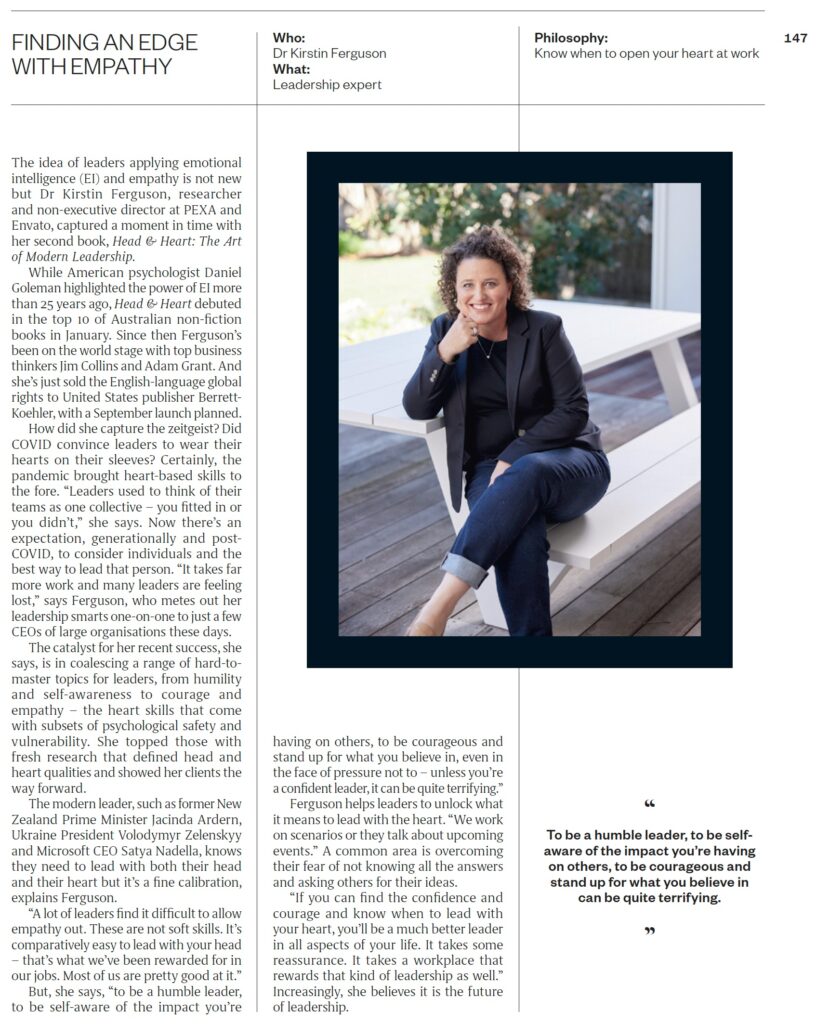
Complete the Head & Heart Leader Scale™ and receive a free, personalised report here.
Complete the Head & Heart Leader Scale™ and receive a free, personalised report here.
1 July 2023
Deborah Tarrant
The idea of leaders applying emotional intelligence (EI) and empathy is not new but Dr Kirstin Ferguson, researcher and non-executive director at PEXA and Envato, captured a moment in time with her second book, Head & Heart: The Art of Modern Leadership.
While American psychologist Daniel Goleman highlighted the power of EI more than 25 years ago, Head & Heart debuted in the top 10 of Australian non-fiction books in January. Since then Ferguson’s been on the world stage with top business thinkers Jim Collins and Adam Grant. And she’s just sold the English-language global rights to United States publisher Berrett-Koehler, with a September launch planned.
How did she capture the zeitgeist? Did COVID convince leaders to wear their hearts on their sleeves? Certainly, the pandemic brought heart-based skills to the fore. “Leaders used to think of their teams as one collective – you fitted inor you didn’t,” she says. Now there’s an expectation, generationally and post-COVID, to consider individuals and best way to lead that person. “It takes far more work and many leaders are feeling lost,” says Ferguson, who metes out her leadership smarts one-on-one to just a few CEOs of large organisations these days.
The catalyst for her recent success, she says, is in coalescing a range of hard-to-master topics for leaders, from humility and self-awareness to courage and empathy – the heart skills that come with subsets of psychological safety and vulnerability. She topped those with fresh research that defined head and heart qualities and showed her clients the way forward.
The modern leader, such as former New Zealand Prime Minister Jacinda Ardern, Ukraine President Volodomyr Zelensky and Microsoft CEO Satya Nadella, knows they need to lead with both their head and their heart but it’s a fine calibration, explains Ferguson.
“A lot of leaders find it difficult to allow empathy out. These are not soft skills. It’s comparatively easy to lead with your head – that’s what we’ve been rewarded for in our jobs. Most of us are pretty good at it.”
But, she says, “to be a humble leader, to be self-aware of the impact you’re having on others, to be courageous and stand up for what you believe in, even in the face of pressure not to – unless you’re a confident leaders, it can be quite terrifying.”
Ferguson helps leaders to unlock what it means to lead with the heart. “We work on scenarios or they talk about upcoming events.” A common area is overcoming their fear of not knowing all the answers and asking others for ideas.
“If you can find the confidence and courage and know when to lead with your heart, you’ll be a much better leader in all aspects of your life. It takes some reassurance. It takes a workplace that rewards that kins of leadership as well.” Increasingly, she believes it is the future of leadership.





